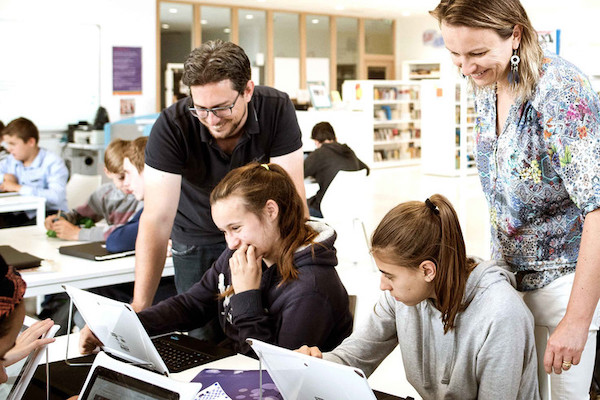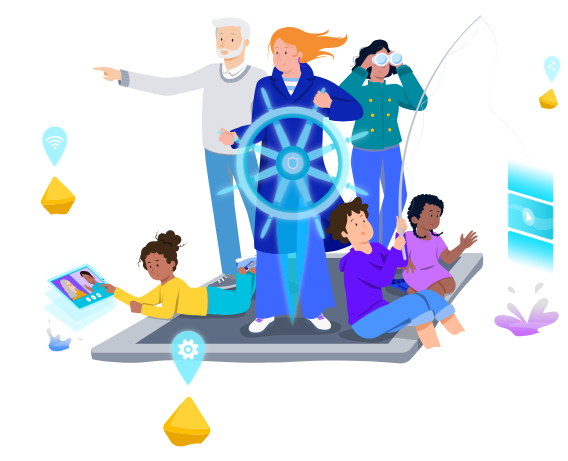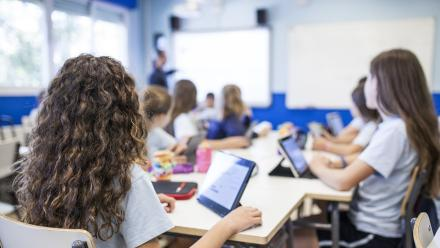Foreword
Two subjects dominate the educational digital news this autumn: the framework for digital use in schools, with, in particular, the generalization of the "digital break" in secondary schools (renamed "laptop break"), and the appropriation of artificial intelligence by the education system. The French Ministry of Education has published a framework for the use of artificial intelligence in education. In February 2025, it announced the development of a sovereign AI to support teachers in their day-to-day practices, and the creation of a Pix course dedicated to artificial intelligence for 2nd level students.
By ceasing to fund paper textbooks and reducing its budget for traditional digital textbooks, in favor of content designed specifically for the Pearltrees digital platform, the Ile-de-France region has reignited the debate on the use of digital and traditional textbooks, their funding and governance: a debate that runs through and divides the educational community.
The debate on digital education was also marked by the publication of three reports:
- The Cour des Comptes (French National Audit Office) has taken a look atprimary education in 2025. It devotes a chapter of its report to the deployment of digital technology. In it, the Cour des Comptes looks back at school equipment policies and the systems put in place. " Despite all these initiatives, which aim to define a concerted strategy between the State and local authorities, and which demonstrate a concern for the appropriation of resources by teachers, many shortcomings are apparent in the development of digital technology in primary education ".
- In its report on the use of digital technology in school-family relations, the General Inspectorate for Education, Sport and Research (IGESR) gives a rather positive assessment of digital workspaces (ENT). It is concerned, however, about the quasi-monopolistic position of a private publisher in the school life software market. The inspectorate warns of the intensive use of ENTs and school life software, particularly outside school hours. It recommends the implementation of a right to disconnect (no new publications between 8pm and 7am, nor during weekends and vacations). At a time when families who are the furthest removed from the digital world have difficulty accessing or understanding ENT, the Inspectorate recommends mobilizing local authorities, associations, digital advisors, France Services and family allowance funds, as part of an "educational alliance", to maintain and develop support for families in all regions.
- In June 2025, the same Inspectorate General published a report on artificial intelligence in schools. In it, the Inspectorate recommends the rapid implementation of a massive training plan for managers, as well as the rapid introduction of "face-to-face training in all schools to introduce all teachers as quickly as possible to the challenges and primary uses of AI in education". The inspectorate calls for " the construction of a national discourse" around AI, linking digital technology and pedagogy, "enabling equitable deployment throughout the country".
In this report, the Inspectorate General points to a number of contradictions in " the national discourse" on AI held by the institution, foremost among which is "a contradiction between the need to train students in AI and the need to respect a 'digital pause'". A contradiction "which, at least in terms, creates uncertainty about the use of certain digital tools with pupils (particularly in the 1st degree, where the digital break is widely understood as a halt to the use of screens with pupils)".
AI in education: a rapid need for training at all levels, a coherent national discourse to build on
In May 2025, the General Inspectorate for Education, Sport and Research (IGESR) published a report on artificial intelligence in schools. The report is organized in three parts: the first takes stock of AI's place in schools. It is based on a field survey and a consultation (4,943 teachers from five academies took part). The second part looks at the integration of AI into teaching, and the training issues involved (for students, teachers and managers). The third part addresses the issue of AI management in the education system.
The inspectorate strives to identify " areas for rapid action " (the word "rapid" appears 35 times).
A rapid need for training at all levels to ensure that AI is used wisely in education
" Whatever the audience interviewed (students, teachers, managers), they all point to the lack of training as a major obstacle. The media frenzy reinforces, for some players, the feeling of already being outdated ".
The mission recommends the rapid implementation of a massive training plan for managers, as well as the rapid introduction of "face-to-face training in all schools to introduce all teachers as quickly as possible to the challenges and primary uses of AI in education".
"As the issue of AI is likely to evolve rapidly, the school level appears to be the most appropriate to enable a multi-year training plan, the exchange of practices within teams, and the development of a common AI discourse and strategy in each school".
As far as students are concerned, even if reticence is less strong, "the need for training, a framework and guidance on the part of teaching staff is clearly expressed. The mission recommends the rapid implementation of an AI training curriculum that will enable both the training of future specialists and the education of all students in the challenges and uses of AI. Such a curriculum must draw on all school disciplines.
Rapid need for coordination at all levels to ensure equitable deployment across the country
Numerous AI initiatives are currently being developed at school, academy and central administration level: "However, all too often, they remain dependent on the impetus of one person (teacher or manager) who is personally committed to these themes. It is essential that these initiatives be better coordinated, so that they can be shared, evaluated from a pedagogical point of view and promoted throughout the country.
The inspectorate found that "AI governance is still too scattered", and that there are tensions "between a traditionally centralized operation and an administrative reality that is now decentralized. It also points to the existence of duplication. These are particularly visible in the field of training, which is developing without coordinated management between the central administration (DNE, DGESCO, IGÉSR), national operators (Réseau Canopé, France Université Numérique) and academic players".
The Inspectorate General recommends the rapid establishment of coordination bodies at various levels:
- At facility level: this is the level at which strategic choices can be made, adapted to the public served and to specific local conditions;
- At the academic level, to monitor the rapid deployment of the training plan, the AI curriculum and the AI strategy in schools;
- At national level, with the creation of a national AI council bringing together all the players in the administration.
The need for a sustainable business model
The question of tools, and in particular the availability of sovereign tools, is a strong expectation in the field. "In this context, the strategy adopted by the French Ministry of Education aims to encourage the use of sovereign tools that comply with regulations, without prohibiting the use of mass-market tools that students already use.
Questions remain, however, about the cost of using these tools, whether for the general public or specifically developed for education. "Indeed, the French Ministry of Education has encouraged the development of an EdTech sector through P2IA experiments, which have led to the creation of specific tools (...) often acclaimed by experimental teachers, but whose added value has yet to be established. What's more, funding for large-scale, long-term deployment of these tools is currently not guaranteed.
Building a coherent national discourse
The Inspectorate is incisive in pointing out a series of contradictions in "national discourse".
"The lack of coordination between digital and pedagogical steering at national level, coupled with the difficulty of steering in an uncertain context (notably due to the volatility of technologies)" results in a series of contradictions.
- "a contradiction between the need to train students in AI and the need to respect a "digital break" which, at least in terms, creates uncertainty about the use of certain digital tools with students (particularly in the 1st degree, where the digital break is widely understood as a halt to the use of screens with students) ;
- a contradiction between the need to train students in AI and a return to fundamentals, often equated with teaching based on "traditional" methods considered more effective by a significant number of players in the field;
- a contradiction between the deployment of AI, its ecological consequences and education for sustainable development in a school that chooses to use energy-hungry technologies;
- a contradiction between the injunction of the need to train students in AI and the absence of sovereign tools".
The Inspectorate calls for " the construction of a coherent national discourse to provide a clear line between these various contradictions". It would be up to the national AI council to elaborate "this common discourse around AI, articulating digital and pedagogical aspects and enabling equitable deployment across the whole territory".
Référence :
What the AI in Education Framework provides for
On June 14, 2025, the French Ministry of Education published a framework for the use of artificial intelligence in education, the result of a consultation conducted from January to May 2025. For the first time, this document provides a framework for the pedagogical and administrative uses of generative AI in education.
The Usage Framework authorizes the use of AI subject to strict compliance with the values of the École de la République, legal obligations (RGPD, SREN law, European AI regulation).
It sets out a number of principles:
- "AI must be used responsibly and reflectively, drawing on the professional expertise of the staff it can assist, but never replace.
- "AI should only be used if no other less ecologically costly solution satisfactorily meets the need".
- "The use of open-source solutions must be favored".
- "The use of AI services accessible to the general public is authorized provided that no confidential or personal data is used.
- "No member of staff should ask students to use consumer AI services involving the creation of a personal account".
- "The use of AI in educational, pedagogical or administrative decision-making must be exercised transparently and responsibly, with explicit communication about its role and how it has been used."
Teacher-supported and supervised use
"In a pedagogical context, the use of AI to assist and not replace learning and intellectual effort must be supervised and accompanied by the teacher".
1st grade students are made aware of basic AI knowledge, but without directly handling generative AI services".
- As early as the first grade, students are introduced to basic AI knowledge, but without directly handling generative AI services.
- The pedagogical use of generative AI by students, supervised, explained and accompanied by the teacher, is authorized in the classroom from 4th grade onwards, in line with the objectives of school programs and the CRCN.
- Throughout their school career, students receive compulsory training in AI and the issues it raises, at least in 4th year, 2nd year of general, technological and vocational courses, and in the first year of the CAP on the Pix platform.
- In high school, students can use them independently within a learning and training framework explicitly defined by the teacher.
While teachers can propose teaching sequences integrating AI (without students manipulating generative AI before 4th grade), the usage framework reminds us that they must "take care to develop students' critical thinking about these technologies and their use (issues, potential, recommendations for drafting queries, limits and risks)".
For teaching purposes (assistance with lesson preparation, assessment, correction, etc.), " any teacher can use AI accessible to the general public, under his or her own responsibility, bearing in mind that, like any data or information used for teaching purposes, AI-generated productions must be verified and cross-referenced with other sources".
With regard to homework, the usage framework specifies that " the use of an AI to complete all or part of a school assignment, without explicit authorization from the teacher and without it being followed by personal appropriation work based on the content produced, constitutes fraud".
Référence :
A worried AI craze in schools
"Individual, personal practices have long been ahead of policy announcements, and often in the opposite direction. The school world is no exception to these contradictions, which it experiences on a daily basis," observes Bruno Devauchelle (Doctor in ICT) on the Café Pégagique website. "On the one hand, enthusiasts are firing on all cylinders to express their enthusiasm for the potential of AI in education. On the other, teachers are increasingly questioning the dangers, effects and consequences of AI.
"The world of teaching is all the more worried now that the power and proposals of AI are impressive and touch the heart of the profession (...) A student can claim new academic performances with the help of AI. Whether they use it in response to the demands and injunctions of their teachers, or to develop themselves, it is the role and even the place of the teacher that is in question. Teachers, for their part, will use AI to enrich their teaching, whether in terms of media (texts, photos, videos, etc.), content (selection, synthesis) or the design of their teaching (assessment, progression, etc.). Whether they admit it or not, teachers are now using AI more and more".
"Training teachers in AI - yes, but how?" asks Bruno Devauchelle. "On the face of it, it seems straightforward. In day-to-day practice, it's less obvious. First of all, when can teachers be trained? And if it's not in front of the students, will webinars be used (...) Our in-house experience, as a speaker, leads us to believe that this will only be useful if a real collective effort to monitor and share information is put in place in the school. The first step is for everyone to embark on a process of appropriation, the first part of which is personal empowerment, followed by discussion and co-development of how AI can and should be incorporated into everyday life. Worries need to be replaced by a sense of sufficient mastery, both in terms of various limitations and relevant, critical uses".
"We can't ignore our students' use of AI, but we can't abandon our ambition to train their human intelligence".
InTélérama, the Education Numérique Raisonée collective, which now includes some thirty teachers and management staff, calls for a wide-ranging debate on AI in schools.
"For some months now, pupils and students have been using them en masse to delegate their thinking and writing tasks. This observation is provoking a real crisis of meaning for teachers: can we still get students to think for themselves when they have unlimited, free and almost instantaneous access to a virtual assistant that short-circuits any attempt at personal reflection?" (...) We can't ignore the use of AI by our students, but we can't abandon our ambition to train their human intelligence. We must therefore support them in their enlightened use of AI, so that it enhances their intellectual capacities rather than atrophying them. That's what it's all about.
"In its framework document, the French Ministry of Education attempts to define what this good use would be. It offers some general common-sense advice, but appears helpless in the face of the actual use that students make of AI - namely, to offload their work. In fact, when it comes to homework, it is technically impossible to prevent them from using AI-generated content. Faced with this reality, the French Ministry of Education has decided to use AI as a learning tool, authorizing "the pedagogical use of generative AI by pupils, supervised, explained and accompanied by the teacher" from the fourth grade onwards.
However, accepting that the human brain in training relies on AI-generated results, even if reworked, is dangerous on two counts.
On the one hand, this approach threatens students' creativity, because it reinforces the idea that, having become inescapable, AI provides the basic material required before any human reflection, erasing the singularity and diversity of their own paths. (...) On the other hand, this approach requires students to take a step back, which they are often incapable of doing. To critically examine the results generated by AI, you first need to have learned how to produce them yourself".
The collective concludes: "We need to train students in AI through dedicated teaching and, for other subjects, make them understand the need not to give in to the ease it offers them. To convince them of this, we need to reinvent an education that values the joy of creating, the taste for effort and the importance of making mistakes".
Références :
Reinforced measures for supervising the use of digital technology in schools
In her Circulaire de rentrée, 2025, Élisabeth Borne, Minister of National Education, Higher Education and Research, summarizes the main provisions relating to " thereasoned use of digital technology in schools".
"The use of digital technology at school must be part of a progressive approach, adapted to each stage of schooling, to ensure the structured and coherent development of students' skills and enable them to build their citizenship. The health and well-being of students must be fully taken into account, with particular attention paid to limiting excessive exposure to screens and ensuring that digital technology adds educational value. This approach will be regularly presented and explained to families, particularly at the start of the school year.
The experimentation of digital breaks in middle schools has demonstrated positive effects on the school climate, the serenity of students and staff, and the availability of students for learning. The widespread introduction of the Portable en pause system in middle schools should ensure that students' cell phones and other connected objects are effectively kept away from the classroom. The organization of the system will be determined within each middle school in conjunction with the departments and families.
At the lycée, students will be involved in a debate on the place of cell phones within the school, and more generally on digital technology, notably within school democracy bodies. These discussions will feed into the school project.
At the same time, the updating of digital workspaces and school life software will be suspended by default in the evening from 8 p.m. to 7 a.m. and on weekends from Friday 8 p.m. to Monday 7 a.m. (with the exception of schools open on Saturday mornings - from Saturday 2 p.m. to Monday 7 a.m.)".
These provisions will be detailed in a circular inJuly 2025.
Only 8.5% of secondary schools have set up the "Laptop at break" scheme for the start of the new school year.
Two weeks after the resumption of classes, just 8.5% of secondary schools have actually implemented the "Portable en pause" system, reportsLe Monde. According to a survey conducted by the Syndicat national des personnels de direction de l'Éducation nationale (SNPDEN-UNSA). 67% of school heads do not intend to apply it. 42.8% of school heads admit to being in favor of the principle, but consider it too complicated to implement. Only 6.9% feel that it is possible to organize with existing resources. For many school heads, the 2018 ban already effectively regulates cell phone use. In many schools, mobile phone use is now close to zero. They therefore see no need to complicate the system by systematically collecting devices.
Références :
A single digital platform, paper textbooks, digital textbooks: a debate that is resurfacing and dividing the education community
From the start of the 2025 school year, all high school students and teachers in the Île-de-France region will have to use Pearltrees, a unique digital platform for accessing textbooks. The Île-de-France region will stop funding paper textbooks and reduce its budget for traditional digital textbooks, in favor of content designed specifically for Pearltrees and accessible free of charge.
This decision sparked controversy, with the publication of an article in Le Monde, co-signed by textbook publishers, teachers and writers. "It's not just a technical choice.a choice for society. It involves the transmission of knowledge, the link between schools and families, and the freedom of teachers". The signatories point to three errors. "The first is the error of believing that a pile of digital resources can replace a structuring textbook, designed in its entirety by professionals. A textbook enables the progressive construction of knowledge, the legibility of the course and the link between concepts. (...) The error, then, of believing that all pupils have the material and family conditions to find their way around an unstructured world on their own. (...) The error, finally, of believing that innovation requires the imposition of a single tool, designed and administered by a community".
On the Café pédagogique website, Jean-Michel Le Baut, French teacher in Brest and active in the Living Lab Interactik in Rennes, calls for a " reorientation of the debate ". "What if, in this "new school war", we were to work towards a ceasefire? This means overcoming certain biased positions: for or against textbooks, for or against digital technology. It might also mean listening to what others have to say, in order to enlighten and reconsider the debate. Jean-Michel Le Baut begins by distinguishing between "Pearltrees.com", a curation service for the general public, and "Pearltrees Education", the educational service currently deployed in almost 2,000 establishments in France, including high schools in the Paris region. "In real-world educational use, it's a perfectly secure platform, integrated into the GAR, where you build collaborative workspaces and sharing with your classes. Is it difficult to get used to? On the contrary, many users, including students, stress its simplicity and fluidity, provided they use it regularly. As always, this requires ongoing training in its use and possibilities.
To teachers who deplore a " loss of pedagogical control or freedom "Jean-Michel Le Baut points out that "the use of Pearltrees Education is less about accessing digital textbooks (when they are available) than about producing their own 'textbooks', personal or customized, evolving, adapted, differentiated, collaborative, multimedia (...).(...) The platform opens up possibilities not offered by the usual textbooks, whether paper or digital, possibilities that colleagues have found particularly valuable when it came to ensuring "pedagogical continuity" in times of confinement (...). The reality is far more complex and interesting than that portrayed by certain conservatisms, be they economic, political or pedagogical ".
However, Jean-Michel Le Baut acknowledges that questions remain, particularly in terms of governance. "Can we once again massively deploy a teaching tool without consulting the teaching staff? Should we orchestrate a brutal competition between textbooks and platforms, between paper and digital, instead of seeking to articulate them intelligently, instead of encouraging freedom of choice according to the pedagogy we want to implement?".
Références :
Ways to improve the digital relationship between school and parents
Digital technology, with the deployment of digital workspaces (ENT) in the 2000s, and the concomitant rollout of school life software, has profoundly transformed school-family relations, both in terms of pace and methods. Parents now have direct access to course content, diaries, grades, homework and absences. In 2020, the health crisis marked an important turning point in the use of ENT to ensure pedagogical continuity.
This digitization of the school-family relationship, while strengthening parents' ability to support homework, is not without consequences: the possibility for parents to monitor schoolwork on a daily basis can increase pressure at school, with closer supervision, which is not always experienced positively by students, especially those in difficulty or dropping out.
Teachers, for their part, may " feel that their work is being interfered with because parents and their superiors have access to some of their course content", observed the Cnesco in 2020. " They also feel a form of interference in their personal lives because of messaging, and they fear too much solicitation from students and/or parents".
In a report devoted to the impact of digital technology on relations between schools and families, the French General Inspectorate for Education, Sport and Research (IGÉSR) warns of the intensive use of ENT and school life software, particularly outside school hours. It recommends the implementation of a right to disconnect (no new publications between 8 p.m. and 7 a.m., nor during weekends and vacations).
Pointing out that the families furthest away from digital technology have difficulty accessing or understanding ENT, the inspectorate recommends mobilizing departmental councils, associations, digital advisors and France Services, as well as family allowance funds, within the framework of an "educational alliance", to maintain and develop this support in all regions.
The Inspectors General have formulated 16 measures to restore coherence to the development of ENT and school life software, to remove obstacles to their use, to support parents who are far removed from digital technology, and to correct the sometimes stressful use of these tools.
Read more : How is digital technology transforming the school-family relationship?
Linked articles
[Feature] Back to school 2024: digital education torn between sensible use of screens and appropriation of artificial intelligence

[Feature] Back to school 2023: what strategy for digital education?

[File] Digital education at the start of the 2022 school year: an overview of current projects and new initiatives

Pix parents: a new tool for digital parenting

[Feature] How is digital technology transforming the school-family relationship?






